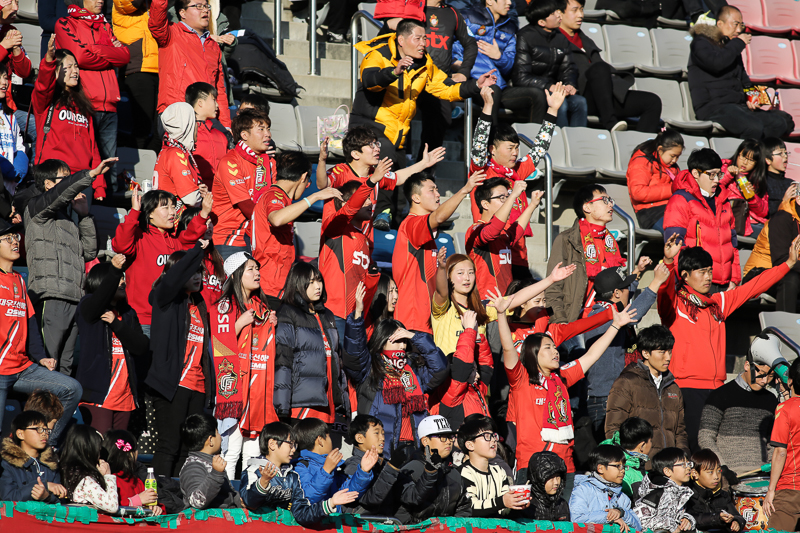
A Political Football – The Fate of Gyeongnam FC
Around 3.45pm on Saturday 6th of December, Gyeongnam FC were officially relegated from the top tier of Korean football (K-League Classic) to the second division (K-League Challenge) thanks to losing out in a home and away play-off match to Gwangju FC. For the couple of thousand Gyeongnam fans at the game, looking forward to the prospect of taking on the likes of Bucheon and Goyang Hi next season was bad enough – but worse was to come.
Not 48 hours after the final whistle, the chairman of Gyeongnam (and provincial governor), Hong Jun-Pyo, announced that the entire running of the club was under review and hinted that the club itself might simply be closed down, sending loyal Gyeongnam supporters, both local and expat, into uproar.
The issue, in its simplest form, is that Korean football clubs (like most football clubs the world over) are loss-making enterprises. They require generous backing from friendly sponsors in order to pay the bills and keep the lights on. In Korea, this sponsorship has generally taken one of two forms – a chaebol owner such as Samsung, LG or Hyundai, willing to run a team as a marketing tool or, in the case of Gyeongnam, funding from a city or provincial government in order to have a team in their area (the so-called citizen clubs).
In both cases, this leaves clubs open largely to the whims of their sponsor, which they rely on for their very existence. In the past this has led to controversy when corporate owners have decided to relocate teams such as LG Anyang Cheetahs and Bucheon SK (now FC Seoul and Jeju Utd respectively). Both decisions linger on in the memories of Korean football fans and leave a bad taste in the mouth for both of the ‘new’ teams. Just last season we had the spectacle of Seongnam fans fighting to save their team when their sponsor (The Unification Church – or the ‘Moonies’ to you and me) decided to no longer fund them. Luckily the city government stepped in at the last minute to give them a reprieve and they went on to a shock win in the Korean FA Cup this season.
Accepted wisdom then was that the citizen model was better for fans as it would avoid evil corporations upping sticks and moving the team across the country. However, with many city and provincial governments now struggling financially, attention is falling onto the budgets for these teams. As politicians come and go, there is also the danger that a football club is seen as someone else’s baby – especially if the current mayor isn’t a fan of football.
Both of these seem to be the case at Gyeongnam and the club looks to be in serious danger. So much so that fans are organising protests and demonstrations to try to persuade Hong that he must keep the club alive.
It would certainly be a sad loss to Korean football if Gyeongnam were to die. Although a relatively new team they have established themselves as a welcome addition to the league and their facilities, youth football setup and general approach is envied by quite a few clubs in the league.
Relegation is always a tough blow, and you expect cutbacks to follow. However, it seems in this case that Hong is using this as an excuse to exercise his own political ideology and get rid of something that he personally doesn’t care for but is important to many of his constituents. The fact that his pronouncement followed so hot on the heels of the result suggests that this wasn’t a result of considered reflection on the situation but either a knee-jerk overreaction to the normal ebbs and flows of sport or, perhaps worse still, a pre-meditated attack on an institution that plays such an important role for his province.
It remains to be seen how this one will play out. It is still early days in the battle and the supporters won’t give up without a fight. It looks unlikely that the club would be picked up by a corporate owner so the hopes of the fans seem to lie with persuading Hong that the club is worth saving or, at an outside chance, perhaps persuading a local city government to take over the funding from the province.
In the meantime, I’m sure all fans of football and sports in general will stand behind the Gyeongnam FC fans in their fight to save their team. At times like this, even rival fans put their differences aside and join against a common enemy – in this case, that enemy seems to be Hong Jun Pyo. He still has time to offer the club a reprieve and redeem himself though.




Just a quick update for anyone interested. It looks like the review of the club has been completed and the decision has made to continue to fund the club .
Great news for the fans. ‘Substantial restructuring’ looks to be on the cards – which no doubt means severe budget cuts – but I’m sure the fans won’t care as long as they have a team to support.